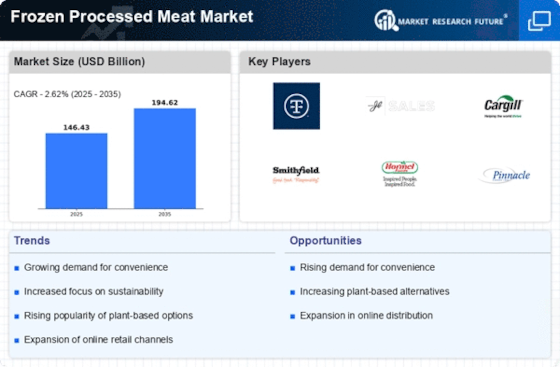Top Industry Leaders in the Frozen Processed Meat Market
The competitive landscape of the frozen processed meat market is marked by dynamic strategies and intense competition among key players striving to capture a substantial market share. As consumer lifestyles become busier, the demand for convenient and ready-to-cook frozen processed meat products has witnessed a significant surge, prompting companies to adopt innovative approaches to cater to evolving consumer preferences.
Key Players:
Marfrig Group (Brazil)
Kerry Group Plc. (Ireland)
BRF S.A. (Brazil)
Associated British Foods Plc (UK)
Pilgrim’s Pride Corporation (US)
Cargill Incorporated (US)
Tyson Foods
Inc. (US)
JBS S.A. (Brazil)
BRF S.A. (Brazil)
Hormel Foods Corporation (US)
NH Foods Ltd. (Japan)
Smithfield Foods (US)
Flanders Provision (US)
Conagra Foods (US)
Keystone Foods (US)
Strategies Adopted:
Strategies employed by key players in the frozen processed meat market revolve around product diversification, strategic partnerships, and operational efficiency. Recognizing the importance of catering to health-conscious consumers, companies are focusing on offering healthier alternatives, such as leaner cuts and products free from additives and preservatives. Marketing efforts also play a crucial role, with companies investing in advertising campaigns to highlight the convenience and quality of their frozen processed meat products.
Strategic partnerships and acquisitions are common strategies aimed at expanding market reach and diversifying product portfolios. For instance, Tyson Foods' acquisition of Hillshire Brands in 2014 enabled the company to strengthen its presence in the processed meat segment. Such strategic moves allow companies to tap into new consumer segments and gain a competitive advantage in the market.

Market Share Analysis:
Several factors influence market share analysis in the frozen processed meat sector. Brand reputation and consumer trust are pivotal, with consumers often opting for products from well-established brands. Pricing strategies and the ability to maintain competitive prices while ensuring product quality are crucial considerations. Additionally, effective distribution networks and partnerships with retailers contribute to a company's ability to reach a wider consumer base.
The regulatory landscape also plays a role, as adherence to quality standards and compliance with food safety regulations are essential for maintaining consumer confidence. Companies that can successfully navigate these factors tend to secure a larger share of the market.
New and Emerging Companies:
While the frozen processed meat market is predominantly led by established players, there is a notable presence of new and emerging companies bringing innovation to the sector. These companies often focus on niche markets, offering unique and specialized frozen processed meat products. The emergence of startups like Beyond Meat, known for its plant-based meat alternatives, reflects the increasing demand for alternatives to traditional meat products.
Industry Trends:
The frozen processed meat market is subject to ongoing industry news and investment trends that shape its competitive landscape. One prevalent trend is the increasing consumer awareness and demand for sustainable and ethically sourced meat products. Companies are responding by investing in supply chain transparency and adopting sustainable practices to meet evolving consumer expectations.
Moreover, the market has witnessed a surge in investment in research and development to create innovative frozen processed meat products. Companies are exploring new processing technologies and formulations to enhance the quality and nutritional value of their products. For instance, Nestlé has been investing in developing plant-based alternatives as part of its commitment to sustainability and catering to the growing demand for meat alternatives.

Competitive Scenario:
The overall competitive scenario in the frozen processed meat market remains robust, driven by the continuous pursuit of product innovation, market expansion, and responsiveness to consumer trends. Established players with a global footprint face challenges in understanding and adapting to diverse regional preferences, necessitating a nuanced approach to maintain market leadership.
Recent Developments:
Premiumization: To satisfy discriminating palates, businesses are branching out into gourmet cuts, premium frozen processed meats manufactured with natural components, and distinctive flavour profiles.
Options that are health-conscious: Companies are responding to consumer demand by providing frozen processed meats that are lower in fat, sodium, and artificial chemicals.










